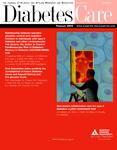ALEXANDRIA, VA--(Marketwire - February 26, 2009) - Researchers and physicians have long debated whether it's more important to strive to control fasting blood glucose levels or the spikes in glucose that occur after eating (post-prandial levels). Now a study, published in the March issue of Diabetes Care, shows there is no significant benefit to choosing one over the other in trying to prevent the progression of cardiovascular disease.
The study, conducted at 105 centers by researchers in 17 countries, was halted early when it became apparent that it didn't matter whether physicians treated hyperglycemia (high blood glucose levels) following a meal or between meals. According to study investigators, neither approach succeeded in reducing the risk for further cardiovascular events. An editorial accompanying the study suggests that, because all of the patients in this study had already been diagnosed with type 2 diabetes and had recently experienced myocardial infarctions, it may have been too late to prevent the progression of disease.
"Differences in post-prandial glycemia between the two therapies were noted, but were less than expected and may have not been enough to have had an impact on the advanced atherosclerosis of this patient population," said Scott Jacober, research physician for Eli Lilly and Company. "As with other trials (DIGAMI-2, ACCORD, ADVANCE and VADT), research in this area is challenging and further investigations on the relationship between glycemia and cardiovascular outcomes may be warranted."
Antonio Ceriello, of the University of Warwick's Clinical Science Research Center, concludes in an accompanying editorial that this study underscores the need to control hyperglycemia, including post-prandial hyperglycemia, much earlier in the progression of diabetes, when doing so can make a much greater difference in preventing diabetes-related complications.
"We have, again, learned how difficult is the optimal control of hyperglycemia, a goal which seems to be mandatory at a very early stage of diabetes," he wrote.
Note: The American Diabetes Association, in conjunction with the American Heart Association and the American College of Cardiology, issued a position statement in December 2008 regarding intensive glycemic control and the prevention of cardiovascular events and the implications of ACCORD, ADVANCE, and VA Diabetes Trials. This statement was published in Diabetes Care and can be found at http://care.diabetesjournals.org/cgi/content/extract/32/1/187.
To schedule interviews with Scott Jacober, Lilly Research Laboratories, contact J. Scott MacGregor, Lilly Global Product Communications, phone: 317-440-4699 or email: macgregorj@lilly.com or, directly email sjacober@lilly.com or phone: 317-433-4281.
To reach editorial author Antonio Ceriello, Warwick Medical School, Clinical Science Research Institute, email Antonio.ceriello@warwick.ac.uk or phone 44(0) 24 7696 8582.
Diabetes Care, published by the American Diabetes Association, is the leading peer-reviewed journal of clinical research into one of the nation's leading causes of death by disease. Diabetes also is a leading cause of heart disease and stroke, as well as the leading cause of adult blindness, kidney failure, and non-traumatic amputations.
The American Diabetes Association is leading the fight against the deadly
consequences of diabetes and fighting for those affected by diabetes. The
Association funds research to prevent, cure and manage diabetes; delivers
services to hundreds of communities; provides objective and credible
information; and gives voice to those denied their rights because of
diabetes. Founded in 1940, our mission is to prevent and cure diabetes and
to improve the lives of all people affected by diabetes. For more
information, please call the American Diabetes Association at
1-800-DIABETES (1-800-342-2383) or visit www.diabetes.org. Information from
both these sources is available in English and Spanish.
Contact:
Dayle Kern
ADA
(703) 549-1500 ext. 2290


 Digg this
Digg this Bookmark with del.icio.us
Bookmark with del.icio.us Add to Newsvine
Add to Newsvine


